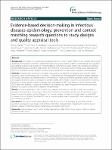Evidence-based decision-making in infectious diseases epidemiology, prevention and control: matching research questions to study designs and quality appraisal tools
Harder, Thomas
Takla, Anja
Rehfuess, Eva
Sánchez-Vivar, Alex
Matysiak-Klose, Dorothea
Eckmanns, Tim
Krause, Gérard
Gomes, Helena de Carvalho
Jansen, Andreas
Ellis, Simon
Forland, Frode
James, Roberta
Meerpohl, Joerg J.
Morgan, Antony
Schünemann, Holger
Zuiderent-Jerak, Teun
Wichmann, Ole
Background: The Project on a Framework for Rating Evidence in Public Health (PRECEPT) was initiated and is being funded by the European Centre for Disease Prevention and Control (ECDC) to define a methodology for evaluating and grading evidence and strength of recommendations in the field of public health, with emphasis on infectious disease epidemiology, prevention and control. One of the first steps was to review existing quality appraisal tools (QATs) for individual research studies of various designs relevant to this area, using a question-based approach. Methods: Through team discussions and expert consultations, we identified 20 relevant types of public health questions, which were grouped into six domains, i.e. characteristics of the pathogen, burden of disease, diagnosis, risk factors, intervention, and implementation of intervention. Previously published systematic reviews were used and supplemented by expert consultation to identify suitable QATs. Finally, a matrix was constructed for matching questions to study designs suitable to address them and respective QATs. Key features of each of the included QATs were then analyzed, in particular in respect to its intended use, types of questions and answers, presence/absence of a quality score, and if a validation was performed. Results: In total we identified 21 QATs and 26 study designs, and matched them. Four QATs were suitable for experimental quantitative study designs, eleven for observational quantitative studies, two for qualitative studies, three for economic studies, one for diagnostic test accuracy studies, and one for animal studies. Included QATs consisted of six to 28 items. Six of the QATs had a summary quality score. Fourteen QATs had undergone at least one validation procedure. Conclusions: The results of this methodological study can be used as an inventory of potentially relevant questions, appropriate study designs and QATs for researchers and authorities engaged with evidence-based decision-making in infectious disease epidemiology, prevention and control.
No license information

